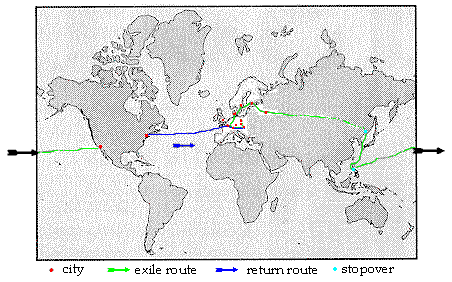
|
Brecht
live in innovative and turbulent times.
From his birth to the formative years, Germany was experiencing one of the most innovative periods in arts and literature. The center of German and international politics, Munich and Berlin were also becoming the beacons of European culture. Brecht first came to Munich from his birthplace Augsburg to study at the university. There he met two influential figures in his career: Lion Feuchtwanger and Karl Valentin. He also had his first play premiered and gained the attention of the theatre critic Herbert Jhering. Brecht made a first attempt to break into the Berlin literary scene in 1921, yet it proved to be a cold winter. Nonetheless, Brecht soon gained his national fame when he was awarded the prestigious Kleist Prize in 1922. In 1924, with an impressive résumé, he moved to Berlin. His years in Berlin were filled with publication and production plans as well as new projects on plays and short stories. Also important was his association with the communist artists and his studies in Marxism (spurred by a play project about Chicago wheat exchange market). The success of The Threepenny Opera (1928) brought him both international fame and financial stability. The rise of the Nazi party finally forced Brecht into exile in 1933. One day after the Reichstag Fire on February 27, we find Brecht in Prague as his wife temporarily settled in Vienna, her birthplace. Brecht moved on to Zürich, looking for a safe and economic place to stay. His friend Bernard von Bretano offered a temporary residence in Lugano, Switzerland, while Brecht traveled to Paris for The Seven Deadly Sins. After the ballet project, the Brechts accepted an invitation from Weigel's old colleague Karin Michaelis to settle in Denmark. They arrived in Thürø and two months later moved in a house in Skovsbostrand (on the small island known as the "garden of Denmark," Fünen). This would be the residence for the Brecht family until 1939. During these six years, Brecht traveled to Copenhagen, Paris, Moscow, New York and London for various projects, as many German refugees would also pay visit to Brecht's temporary home. Near the end of April 1939, Brecht delivered the speech "On Experimental Theatre" in Stockholm as Nazi troops advanced on. In May the Brecht family moved to Lidingö, Sweden. A year later they further moved to Helsinki thanks to Hella Wuolijoki's help in obtaining the necessary papers; meanwhile the Brecht family would apply for an American visa. In July 1940, Wuolijoki invited the Brechts and Margarete Steffin to stay at her country estate at Marlebäck. In May 1941, Brecht obtained the American visa and travelled to Moscow (to avoid the Nazi-controlled Finnish seaports). Forced to leave Margarete Steffin behind in Moscow for her tuberculosis, the Brechts and Ruth Berlau boarded the trans-Siberian train for the Pacific seaport Vladivostok. The news of Steffin's death later reached the playwright while on board the train. On June 13, they got aboard "Annie Johnson," heading the United States via Manila. As the ship arrived in San Pedro (the harbor for Los Angeles) on July 21, they were advised to stay in Santa Monica for an opportunity to work in the movie industry. This would be the home for the next six years while Ruth Berlau sought work in New York. By this time Brecht's financial situation was stringent as the income from royalties sharply decreased due to the expansion of the war. Brecht, as a film writer, was only occasionally engaged in contributing story ideas or storylines and the income generated at first could barely cover their daily expenses. Weigel's hope for a job in the theatre was also limited due to the language barrier (except for a tiny role in the film The Seventh Cross [1944, MGM]) but she was an excellent hostess for a stream of house guests. During the six years in the States, Brecht also had several extended visits to New York and New England, arranging production opportunities on Broadway and working with German emigres on other matters. His American experience would end in Washington at the House Committee on Un-American Activities in October 1947. November 1, 1947, Brecht arrived in Paris, the first stop on his way home. Accessing the post-war situation in Berlin, Brecht decided to stay in Zürich first (later moved in a house in Feldmeilen). During the interim year before his trip to Berlin, he took the advice from his childhood friend Caspar Neher to collaborate with Gottfried von Einem for the newly revived Salzburg Festival.
The final resting place for Bertolt Brecht and Helene Weigel is at Dorotheenstädtischer Friedhof. |
 October
1948, Brecht finally embarked on his return journey to Berlin
after fifteen years via Prague (the authorities
of the American Zone had denied his travel permit). The Kulturbund at first
arranged him in a temporary residence at the Hotel
Adlon overlooking the wrecked post-war Berlin. In May 1949 the Brechts
settled in
October
1948, Brecht finally embarked on his return journey to Berlin
after fifteen years via Prague (the authorities
of the American Zone had denied his travel permit). The Kulturbund at first
arranged him in a temporary residence at the Hotel
Adlon overlooking the wrecked post-war Berlin. In May 1949 the Brechts
settled in